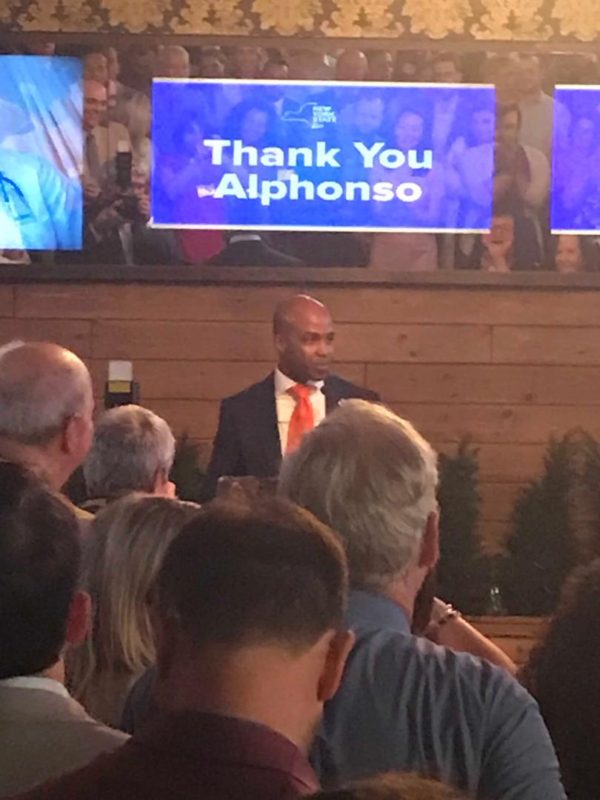7.31 On a taped 1971 phone conversation, Governor Reagan discusses a UN event with President Nixon, “Last night, I tell you, to watch that thing on television as I did . . . To see those, those monkeys from those African countries — damn them, they’re still uncomfortable wearing shoes!”
7.31 Cory Booker: “We lost the state of Michigan because everybody from Republicans to Russians were targeting the suppression of African American voters.”
7.31 Kirsten Gillibrand: “So the first thing that I’m going to do when I’m president is I’m going to Clorox the Oval Office”
7.31 Night 2 of the Democratic debates. Jimmy Kimmel: “It was ‘Joe Versus the Volcano.'”
7.30 Marianne Willaimson on reparations: First of all, it’s not $500 billion in ‘financial assistance.’ It’s $500 billion dollars — $200 to $500 billion dollars — payment of a debt that is owed. That is what reparations is. We need some deep truth-telling when it comes. We don’t need another commission to look at evidence, I appreciate what Congressman O’Rourke has said. It is time for us to simply realize that this country will not heal. All that a country is is a collection of people. People heal when there is some deep truth-telling. We need to recognize when it comes to the economic gap between blacks and whites in America. It does come from a great injustice that has never been dealt with. That great injustice has had to deal with the fact that there were 250 years of slavery followed by another 100 years of domestic terrorism. What makes me qualified to say $200 to $500 billion dollars? I’ll tell you what makes me qualified. If you did the math of the 40 acres and a mule given that there were four to five million slaves at the end of the Civil War and they were all promised 40 acres and a mule for every family of four. If you did the math today it would be trillions of dollars. And I believe anything less than $100 billion dollars is an insult and I believe that $200 to $500 billion is politically feasible today because so many Americans realize there is an injustice that continues to form a toxicity underneath the surface and an emotional turbulence that only reparations will heal.
7.30 Bernie Sanders sneers to John Delaney “Profits.”
7.30 Elizabeth Warren: “I don’t understand why anybody goes to all the trouble of running for president of the United States just to talk about what we really can’t do and shouldn’t fight for. I don’t get it.”
7.28 Trump calls Baltimore “a disgusting, rat and rodent infested mess”
7.25 Karen Tumulty in the Post: to focus on Trump, and whether his actions constitute impeachable offenses, is to miss the real bombshell in Mueller’s testimony — the scandal that could be unfolding right there in front of us. hat was Mueller’s warning that what happened in 2016 could happen again. Asked by Rep. Will Hurd (R-Tex.) whether Russia might be planning another attack on the integrity of U.S. elections, Mueller replied: “They’re doing it as we sit here, and they expect to do it in the next campaign.” He said “many more countries” are developing the capability to do so as well. “I hope this is not the new normal,” Mueller added, “but I fear it is.” There is a good chance that Wednesday’s testimony marked the last time we will ever hear the former special counsel say anything on the subject in public. The message he wanted to deliver was that, in wrestling with the problematic past, we should not take our sights off a treacherous future. While that may not have made for electrifying television, Mueller delivered the goods.
7.25 EJ Dionne in the Post: his steadiness in the face of repeated Republican provocations and his unwavering confirmations of his report’s genuinely scandalous findings about Trump sent a message: Only a country that doesn’t care about the rule of law, has given up on holding presidents accountable and is too cowardly to stand up to foreign interference in our elections would simply let all of this go. Wednesday provided a mandate for pressing on.Late in the Judiciary Committee session, Rep. Greg Stanton (D-Ariz.) underscored what was going on. “The attacks on you and your team intensified because your report is damning,” Stanton said, “and I believe you did uncover substantial evidence of high crimes and misdemeanors.”
7.25 Dana Milbank in the Post: Maybe the 74-year-old former FBI director had lost something off his fastball. Or maybe he simply felt hemmed in by so many restrictions — real and imagined — applied to his testimony by the Justice Department and by himself, that he couldn’t say anything at all. Whatever the reason, Republican lawmakers eviscerated him, assaulting his integrity and his ethics, questioning his political motivations, disparaging the FBI and even casting doubt on Russia’s interference in the election. Mueller offered little by way of defense and frequently absorbed the blows in silence.
Nearly every top Trump campaign aide was involved in meetings with Russians. No offers of assistance were rebuffed. Nobody told authorities. Almost all lied about their contacts. Much of the campaign foreign policy team is in jail. Nobody has ever explained why they met Russians.
— John Sipher (@john_sipher) July 24, 2019
7.24 Schiff: During the course of this Russian interference in the election, the Russians made outreach to the Trump campaign, did they not?
Mueller: That occurred. [. . .]
Schiff: The campaign welcomed the Russian help, did they not?
Mueller: We report indications that that occurred, yes. [. . .]
Schiff: The president himself called on the Russians to hack [Hillary Clinton’s] emails?
Mueller: There was a statement by the president on those general lines.
Schiff: Numerous times during the campaign, the president praised the releases of the Russian-hacked emails through WikiLeaks?
Mueller: That did occur. [. . .]
Schiff: Apart from the Russians wanting to help Trump win . . . Donald Trump was trying to make millions from a real estate deal in Moscow?
Mueller: You’re talking about the hotel in Moscow? Yes.
Schiff: When your investigation looked into these matters, numerous Trump associates lied to your team, the grand jury and to Congress?
Mueller: A number of people we interviewed in our investigation, it turns out, did lie…
Schiff: When the president said the Russian interference was a “hoax,” that was false, wasn’t it?
Mueller: True[. . .]
Schiff: In short, your investigation found evidence that Russia wanted to help Trump win the election, right?
Mueller: I think, generally, that would be accurate. [. . .]
Schiff: Russia committed federal crimes in order to help Donald Trump?
Mueller: You’re talking about the computer crimes charged in our case? Absolutely.
Schiff: Trump campaign officials built their strategy, their messaging strategy, around those stolen documents?
Mueller: Generally, that’s true.
Schiff: And then they lied to cover it up?
Mueller: Generally, that’s true.
7.24 BUCK: You believe that he committed … you could charge the president of the United States with obstruction of justice after he left office?
MUELLER: Yes
7.24 Mueller: “The president was not exculpated for the acts that he allegedly committed.”
7.24 Nadler: Director Mueller, the president has repeatedly claimed that your report found there was no obstruction, and that it completely and totally exonerated him. But that is not what your report said, is it?
Mueller: Correct. That is not what the report said….
Nadler: Now, in fact, your report expressly states that it does not exonerate the president.
Mueller: It does.
Nadler: And your investigation actually found, quote, “multiple acts by the president that were capable of exerting undue influence over law enforcement investigations, including the Russian interference and obstruction investigations.” Is that correct?
Mueller: Correct.
Nadler: Now, Director Mueller, can you explain in plain terms what that finding means so the American people can understand it?
Mueller: Well, the finding indicates that the president was not exculpated for the acts that he allegedly committed.
Nadler: In fact, you were talking about incidents, quote, “in which the president sought to use his official power outside of usual channels,” unquote, to exert undo influence over your investigations, is that right?
Mueller: That’s correct
7.24 Boris Johnson becomes Prime Minister of the UK
7.24 Ilhan Omar: “It’s when we bond together, when we understand our ability to build community rises from the most painful places, that we are able to have the kind of celebrations that we had in Minnesota. I want to make sure people in every single state that feel the intensity of the divisions [know] that they could, too, overcome, and they, too, can do the work of building community and finding out what are the values that unite them.”
7.24 Washington Post: The U.S. government on Wednesday issued an unprecedented rebuke of Facebook after a year of massive privacy mishaps, charging that the company deceived its users and “undermined” choices they made to protect their data as part of a settlement that requires the tech giant to pay $5 billion and submit to significant federal oversight of its business practices.
7.24 Washington Post: “Researchers have begun to identify correlations between Trump’s election and worsening cardiovascular health, sleep problems, anxiety and stress, especially among Latinos in the United States.”
7.23 Trump: “I have an Article II, where I have to the right to do whatever I want as president.”
7.23 Washington Post: Mueller‘s long-awaited report was released publicly in April, and much of the discussion centered around its examination of Russian interference in the 2016 election and whether Trump obstructed the special counsel’s probe. But to Yale University professor Bandy Lee and four other mental health experts, the report provided proof the president lacks basic capacity to make sound, rational decisions. Using the Mueller report to evaluate the president’s mental fitness is a controversial tactic, and Lee has her share of critics, including other medical professionals. The president’s mental state is so fundamental to his behavior — specifically, how he might exercise his commander-and-chief role — that it overrides any other concerns about his actions, Lee and her colleagues contend. “What was really alarming to us is the president did not meet any of the criteria for mental capacity and the level of incapacity was beyond our expectation,” Lee told me
7.23 Albany
7.22 Albany
7.22 The Atlantic:
Stock buybacks are when a company uses its money to, well, buy back some of its publicly traded stock, a tactic used to boost a company’s share prices by reducing available shares left on the market, and thus enrich stockholders, including its CEOs. The once-illegal practice sounds bland enough in name, but such benefits are short-lived and come at a price, Jerry Useem argues in the latest issue of our magazine: “Even the staunchest free-market capitalist should be concerned,” he writes. That’s because buybacks, rarely used to these ends before the 1980s, are becoming monstrously common. And money invested in buybacks means money not invested in other things, like worker salaries, better equipment, and R&D. “Federal Reserve data show that buybacks are now equivalent to 4 percent of annual economic output, up from zero percent in the 1990s,” Annie Lowrey reported last year. Analysts estimate that a startling 40 to 60 percent of the benefits from the 2017 Trump administration tax-cut package “are being plowed into buybacks.” Key stats:
$3.8 trillion The amount American companies overall spent on buybacks over the past nine years, according to Federal Reserve data compiled by Goldman Sachs
$30 million Additional earnings for Craig Menear, the chairman and CEO of Home Depot, through stock sales (on top of his $11.4 million stated compensation in 2018, according to SEC filings)
$23,000 Median worker pay at Home Depot
$18,000 The raise each worker could’ve received had the company invested in worker pay and not stock buybacks, according to research
$14 billion Amount Merck spent in 2018 on stock buybacks and dividends
$10 billion Amount Merck spent in 2018 on R&D
But one big company that notably isn’t participating in this trend? Amazon. The company hasn’t bought back stock in seven years. Instead, it’s invested strategically in things like pay. (Remember its high-profile decision to raise its minimum wage to $15?)
7.22 Henry Olsen in the Washington Post: Trump voters were angry because they believed that the national promise of liberty and equality for all was being shunted aside in favor of the interests and moral preferences of the educated, secular and urban regions of the country. Any new conservatism must grapple with this sentiment and integrate it with principles that also appeal to immigrants, their children and those in educated, urban classes who wish to live in harmony with all Americans. That conservatism must be distinctly less libertarian in its economics and distinctly less denominationally Christian in its social rhetoric to have any chance of success. Unfortunately, too many of the speakers failed to understand this. Instead, they offered a vision of American nationhood that is both romanticized and highly inaccurate. As such, they misdiagnose what America both was and is and offer the new conservatism a poisoned chalice from which to drink.
7.21 Rep. Jerry Nadler to Chris Wallace: “The [Mueller] report presents very substantial evidence that the president is guilty of high crimes and misdemeanors and we have to present — or let Mueller present — those facts to the American people and then see where we go from there.”



 7.18 Saying goodbye to Alphonso David. With Robert Mujica, Jim Malatra, Bill Mulrow and Melissa DeRosa
7.18 Saying goodbye to Alphonso David. With Robert Mujica, Jim Malatra, Bill Mulrow and Melissa DeRosa
7.18 Jim Vandehei in Axios: “The single biggest threat to Republicans’ long-term viability is demographics. . .The numbers simply do not lie: America, as a whole, and swing states, in particular, are growing more diverse, more quickly. There is no way Republicans can change birth rates or curb this trend. Another way to say it: There’s not a single demographic megatrend that favors Republicans. Why it matters: President Trump’s short-term calculation to stir up white voters with race-baiting rhetoric might very well echo for a generation.
7.17 Trump at a “Make America Great Again” campaign rally in Greenville, NC. “I have a suggestion for the hate-filled extremists who are constantly trying to tear our country down. They never have anything good to say. That’s why I say, ‘Hey if you don’t like it, let ’em leave, let ’em leave.'” The audience: “Send her back!”
7.16 Richard Cohen in the Washington Post: There are red states, blue states and, it is now clear, yellow states. The yellow states are represented in Congress by Republicans too cowardly to condemn a president who resorts to unabashed racism not only to stir his base but also to express his genuine bigotry. President Trump does not drink. Stark sober, he is drunk on hate.
7.16 George Will on a New York Times Book Review podcast: “I believe that what this president has done to our culture, to our civic discourse, you cannot unring these bells and you cannot unsay what he has said, and you cannot change that he has now in a very short time made it seem normal for schoolboy taunts and obvious lies to be spun out in a constant stream. This will do more lasting damage than Richard Nixon‘s surreptitious burglaries did.”
7.15 Chris Evans
This is racist, Biff.
The only thing worse than actually being hateful and racist, is casually wielding hate and racism to activate your base in an unrelenting, painfully transparent, and crushingly on-brand effort to soothe your only true devotion: feeding your insatiable ego. https://t.co/WfU1uUp9Ya
— Chris Evans (@ChrisEvans) July 15, 2019
7.15 Washington Post: Trump recently told West Wing aides that Senate Majority Leader Mitch McConnell told him no politician had ever lost office for spending more money. Two people with direct knowledge confirmed that McConnell delivered that message in a June phone call about budget sequestration
7.15 AOC replies: Mr. President, the country I “come from,” & the country we all swear to, is the United States. But given how you’ve destroyed our border with inhumane camps, all at a benefit to you & the corps who profit off them, you are absolutely right about the corruption laid at your feet.
So interesting to see “Progressive” Democrat Congresswomen, who originally came from countries whose governments are a complete and total catastrophe, the worst, most corrupt and inept anywhere in the world (if they even have a functioning government at all), now loudly……
— Donald J. Trump (@realDonaldTrump) July 14, 2019
….it is done. These places need your help badly, you can’t leave fast enough. I’m sure that Nancy Pelosi would be very happy to quickly work out free travel arrangements!
— Donald J. Trump (@realDonaldTrump) July 14, 2019
7.14 In a tightly wound, nearly five hour-long match, Novak Djokovic defeated Roger Federer, 7-6 (5), 1-6, 7-6 (4), 4-6, 13-12 (3), to capture the Wimbledon’s men’s singles title. It was Djokovic’s fifth Wimbledon singles title, and he secured it by saving two match points on Federer’s serve and then prevailing in the fifth-set tiebreaker at 12-12, the first of its kind in a Wimbledon final.
7.14 Maureen Dowd in the Times: Congress is not a place where you achieve radical progress — certainly not in divided government. It’s a place where you work at it and work at it and don’t get everything you want. The progressives act as though anyone who dares disagree with them is bad. Not wrong, but bad, guilty of some human failing, some impurity that is a moral evil that justifies their venom. . . . In the age of Trump, there is no more stupid proposition than that Nancy Pelosi is the problem. If A.O.C. and her Pygmalions and acolytes decide that burning down the House is more important than deposing Trump, they will be left with a racist backward president and the emotional satisfaction of their own purity.
7.13 Blackout in Manhattan on west side–theater district and west side up to 71st Street lose power after fire at a substation
7.11 Kim Hart in Axios: “Big cities are poised to get bigger, richer and more powerful — at the expense of the rest of America.. . .Why it matters: Automation may end up adding more jobs than it destroys, but the McKinsey analysis of 315 cities and more than 3,000 counties shows that only the healthiest local economies will be able to adapt to the coming disruption. Wide swaths of the country, especially already-distressed rural regions, are in danger of shedding more jobs. The 25 most prosperous cities, which have led the recovery from the Great Recession, are poised to get stronger. Those megacities could claim at least 60% of job growth through 2030. The big picture: The labor market will become more polarized. . . ,On one end of the spectrum are a few dozen successful cities with diversified economies and a lot of young, highly educated workers. On the other end are “trailing” cities and rural regions with aging workforces, lower education levels and jobs that are highly susceptible to automation. Between those extremes is a group of thriving niche cities, such as Sunbelt cities popular with retiring baby boomers and college towns. There’s also a broader “mixed middle,” including stable cities like St. Louis and unique economies like Lancaster, Pa. Making matters worse, workforce mobility is at historic lows, meaning far fewer people are moving to new counties or states. “And when they do move, they go to places very similar to where they came from,” said McKinsey partner Susan Lund, one of the leaders of the research. That means people from distressed areas aren’t finding their way into more prosperous ones, deepening their sense of being left behind — and likely leading to greater social and political turmoil. What’s next: It’s going to be up to local and federal policy makers to proactively create employment paths for the those most likely to face displacement, Lund said “Lifting up these places will not just happen naturally,” she said. “It will take a concerted effort.”
7.11 Dinner at the Lindstroms

7.9 Gov. Cuomo: “I am the left. I am the left!”
7.9 Albany
7.8 Albany
7.8 EJ Dionne in the Washington Post: David Miliband, the chief executive of the International Rescue Committee, reminded us in a recent speech that the effects of what he called the “democratic recession” are being felt most catastrophically by civilians living in lawless failed states, many of them caught up in civil wars and waves of persecution. As moral inhibitions are swept away, innocents are exposed to unspeakable horror. Miliband called ours the “Age of Impunity,” a moment “when those engaged in conflicts around the world — and there are many — believe they can get away with anything, including murder, whatever the rules and norms. And because they can get away with anything, they do everything.” His list of “everything” should call us all up short: “Chemical weapons, cluster bombs, land mines, bombing of school buses, besiegement of cities, blocking of humanitarian supplies, targeting of journalists and aid workers. You name it, we are seeing it, and seeing more of it, and seeing less outrage about it and less accountability for it.”
7.7 Franklin Foer in The Atlantic: this team is a reminder of the best of the American ethos—the promise of ever-expanding equality, the spirit of reform that yielded Title IX and laid the basis for American female soccer supremacy, the carnival of individuality that is the team’s roster. At a time of despair, the players represent a form of not-so-utopian hope: how a community of different backgrounds and sexual orientations relates to one another with familiar affection. A lesbian activist who protests police brutality has become a national hero. Draped in the Stars and Stripes, this team demonstrates how civic patriotism has an equal claim to representing the country.
7.7 Julie Foudy: “In ’99, we envisioned [winning the World Cup] as a catalyst that would spark a global movement, but the reality is I think it was a domestic one. I see the 19ers as responsible for a global movement. We’re seeing the numbers, but even beyond that, they set an example for women on standards of expectations. There are so many countries who are finally standing up and saying this isn’t right, and they have the courage as a player to stand up in one of these countries and say, ‘This needs to be better, not just for us but for the next generation.’ I think a lot of that comes from them seeing this U.S. group do this at a level that’s unprecedented.”
7.7 Ain’t Too Proud with Ginny
7.7 USWNT beats Netherlands 2-0, wins second consecutive World Cup. Meghan Rapinoe is MVP
7.7 Martin Charnin dies at 84
7.6 Bury the Hatchet with Ginny, Molly, Cara, Shawn and Joe
7.7 UK Ambassador Kim Darroch, in confidential cables: “We don’t really believe this Administration is going to become substantially more normal; less dysfunctional; less unpredictable; less faction riven; less diplomatically clumsy and inept.. . . “For a man who has risen to the highest office on the planet, President Trump radiates insecurity.”. . . Do not write him off. … Trump may emerge from the flames, battered but intact, like [Arnold] Schwarzenegger in the final scenes of The Terminator.”
7.6 Nancy Pelosi: “All these people have their public whatever and their Twitter world, but they didn’t have any following. They’re four people and that’s how many votes they got.”
 7.5 A nine foot statue of Melania Trump, carved from the trunk of a linden tree, was unveiled in Sevnica, Slovenia, the first lady’s hometown of , Slovenia. Rising nine feet from the trunk
7.5 A nine foot statue of Melania Trump, carved from the trunk of a linden tree, was unveiled in Sevnica, Slovenia, the first lady’s hometown of , Slovenia. Rising nine feet from the trunk
7.5 Sebastian Junger in the Post: The fact that political opinion is rooted to some degree in our genes and biology means that both liberalism and conservatism may be adaptive traits that got passed down through thousands of human generations because they helped us survive. But another trait that is clearly adaptive is our ability to get along. Political arguments may rage within families, communities and even nations, yet they only rarely threaten the cohesion of the group. On some level, humans seem to understand that differences of opinion are unpleasant but splitting up may be even more unpleasant — or downright dangerous. Humans don’t survive alone in nature. Today, many people are concerned that the United States is splitting along ideological lines. With no credible enemy to encourage unity, the country finds itself in a deep political argument in which both liberals and conservatives accuse the other of not only being wrong but of being a threat to the country. The real threat to the country, of course, is bellicose, divisive rhetoric. But this is where evolution might throw Americans a lifeline.If liberalism and conservatism are partly rooted in genetics, then those worldviews had to have been adaptive — and necessary — in our evolutionary past. That means that neither political party can accuse the other of being illegitimate or inherently immoral; we are the way we are for good reason. Every human society must do two things: It must be strong enough to protect itself from outside groups, and it must be fair enough to avoid internal conflict. A society entirely composed of liberals risks being overrun by enemies, and a society entirely composed of conservatives risks breaking apart over issues of inequality — “social justice,” as it’s now termed
7.5 Mad magazine ceases publication
7.5 Donald Ayer in The Atlantic: Trump and his endless assertions of power offer countless opportunities to pick and choose those executive-power claims with the best chance to succeed in court. Thus, in the Trump administration, Barr may have found the ideal setting in which to pursue his life’s work of creating an all-powerful president and frustrating the Founders’ vision of a government of checks and balances. His strange pursuit of an investigation of the investigators — on the supposition that the FBI may have been improperly “spying” on the Trump campaign when they investigated Trump associates who were found to have met with various Russians — may be the opening public chapter in that endeavor.
7.5 The Washington Post: This is a “two-tier recovery,” said Matthew Mish, head of credit strategy at the investment bank UBS. About 60 percent of Americans have benefited financially, he said, while 40 percent have not. The 40 percent — which Mish calls the “lower tier” — have seen paltry or volatile wage growth, rising expenses for housing, health care and education, and increased levels of personal debt. They tend not to own homes or many stocks. In discussions with 30 Americans unable to pay all of their bills, a clear pattern emerged: Most were able to eke by until they faced an unexpected crisis such as a job loss, cancer, car trouble or storm damage. The extra expense caused them to get behind on their bills, and they never fully rebounded. Economists fear such precarious financial situations put many Americans at risk if there is even a mild setback in the economy, potentially setting up the next recession to be worse than anything in recent history except the Great Recession.
7.5 Fareed Zakaria in the Post: The fundamental flaw of modern conservatism is that it is unsure whether America today is a fallen republic or an astonishing success story. This confusion has produced a political crisis among conservatives, which might help explain the rise of Trump.
7.4 Justin Amash in the Post: The founders envisioned Congress as a deliberative body in which outcomes are discovered. We are fast approaching the point, however, where Congress exists as little more than a formality to legitimize outcomes dictated by the president, the speaker of the House and the Senate majority leader. With little genuine debate on policy happening in Congress, party leaders distract and divide the public by exploiting wedge issues and waging pointless messaging wars. These strategies fuel mistrust and anger, leading millions of people to take to social media to express contempt for their political opponents, with the media magnifying the most extreme voices. This all combines to reinforce the us-vs.-them, party-first mind-set of government officials. Modern politics is trapped in a partisan death spiral
7.4 Trump: “In June of 1775, the Continental Congress created a unified Army out of the Revolutionary Forces encamped around Boston and New York, and named after the great George Washington, commander in chief. . .Our Army manned the air, it rammed the ramparts, it took over the airports, it did everything it had to do, and at Fort McHenry, under the rocket’s red glare it had nothing but victory.”
7.3 Max Boot in the Post: A desire to be the center of attention has been — along with a desire for money and a desire to grab women by their private parts — Trump’s defining passion in life. It is why he has plastered his name on so many buildings and products. Why he fed the New York tabloids so many stories about himself. And ultimately why he ran for president. He didn’t think he’d win — it was just a way to get the attention he’s always craving. Remarkably enough, Trump hasn’t become any less needy and greedy for publicity since he entered the White House. Having drunk so deeply at the well of ego gratification, he keeps coming back for ever-bigger gulps.
7.3 Haircut
7.2 US defeats England 2-1 to advance to the finals
7.2 Rocketman
7.1 Overcrowding in migrant detention camps exposed
7.1 Albany
